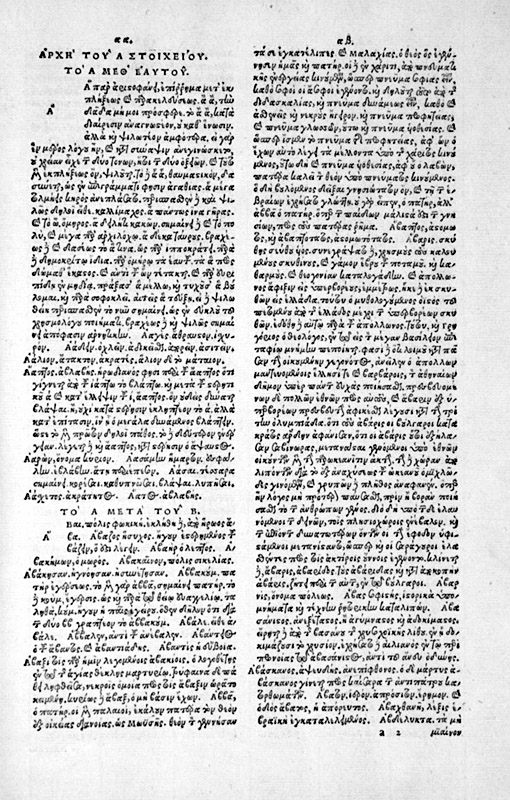
Suda
The Suda or Souda (/ˈsuːdə/; Medieval Greek: Σοῦδα, romanized: Soûda; Latin: Suidae Lexicon)[1] is a large 10th-century Byzantine encyclopedia of the ancient Mediterranean world, formerly attributed to an author called Soudas (Σούδας) or Souidas (Σουίδας). It is an encyclopedic lexicon, written in Greek, with 30,000 entries, many drawing from ancient sources that have since been lost, and often derived from medieval Christian compilers.
For other uses, see Suda (disambiguation) and Souda (disambiguation).Title[edit]
The derivation is probably[2] from the Byzantine Greek word souda, meaning "fortress" or "stronghold", with the alternate name, Suidas, stemming from an error made by Eustathius, who mistook the title for the author's name.[3] Paul Maas once ironized by suggesting that the title may be connected to the Latin verb suda, the second-person singular imperative of sudāre, meaning "to sweat",[4] but Franz Dölger traced its origins back to Byzantine military lexicon (σοῦδα, "ditch, trench", then "fortress").[5][6] Silvio Giuseppe Mercati, on the other hand, suggested a link with the Neo-Latin substantive guida ("guide"), transliterated in Greek as γουίδα.[7]
Background[edit]
Little is known about the compiler of the Suda. He probably lived in the second half of the 10th century, because the death of emperor John I Tzimiskes and his succession by Basil II and Constantine VIII are mentioned in the entry under "Adam" which is appended with a brief chronology of the world.[8] At any rate, the work must have appeared by the 12th century, since it is frequently quoted from and alluded to by Eustathius who lived from about 1115 AD to about 1195 or 1196.[8] It has also been stated that the work was a collective work, thus not having had a single author, and that the name which it is known under does not refer to a specific person.[14]
The work deals with biblical as well as pagan subjects, from which it is inferred that the writer was a Christian.[8] In any case, it lacks definite guidelines besides some minor interest in religious matters.[14]
The standard printed edition was compiled by Danish classical scholar Ada Adler in the first half of the twentieth century. A modern collaborative English translation, the Suda On Line, was completed on 21 July 2014.[15]
The Suda has a near-contemporaneous Islamic parallel, the Kitab al-Fehrest of Ibn al-Nadim. Compare also the Latin Speculum Maius, authored in the 13th century by Vincent of Beauvais.